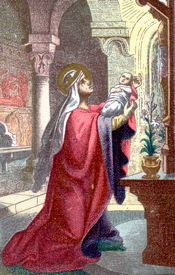Lives of the Saints
Our Models and Protectors
Spiritual Bouquet:
June 3

Saint Clotilda
Queen of France
(† 545)
Saint Clotilda was the daughter of Chilperic, the Catholic King of Burgundy, domain of the Germanic tribe which had entered the southeastern region of ancient France in the fifth century; Chilperic had succeeded his father in that royalty. His jealous older brother, infected with Arianism, declared war on him, surrounded him with an army, captured and slew his own brother and his brother's wife and two sons, while sparing the two daughters, then took over their dominions. Clotilda's older sister became a nun, but the younger daughter was brought up under her uncle's protection, and, by a singular providence, instructed in the Catholic religion. Her beauty, modesty, and Catholic piety inspired the prayers of her fellow Christians that an alliance might be arranged between the young princess and Clovis, king of the Franks, victorious in the north. Nonetheless, Clotilda was half-cloistered by her uncle, for fear the ancient partisans of Childebert might find hope in the hand of the king's daughter.
Her almsgiving at the portico of a church was well known, however, and provided an opportunity for an ambassador of Clovis to present the king's suit, thereby giving to Christian France a history not less captivating than the Old Testament history of Abraham's trusted servant's mission to Mesopotamia to obtain a wife for Isaac. The messenger went to her there with the king's request, and offered her a ring as his pledge; she accepted, and left her own with the envoy in exchange. Thus Clovis I, victorious king of the Franks, gained his suit; the reservation was made by Clotilda, however, that she could only marry a Christian. The ambassador from Clovis, a Roman nobleman in his service, then presented to her uncle the demand that the fiancee of his master be delivered to him to be taken to Clovis. For fear of a war, her uncle consented. In this way did prayer obtain for the young king, not yet Christian but who was the hope of the oppressed Catholics, the Queen destined to become the spiritual mother of the Catholic kingdom of France.
Clovis' fear of giving offense to his people made him delay his conversion. Nonetheless, Saint Clotilda honored her royal husband, studied to sweeten his warlike temper by Christian gentleness, and conformed herself to his humor in matters which were indifferent. And the better to gain his affections, she made whatever she knew most pleased him, the subject of her conversation and interest. When she saw she had won his heart, she did not defer the great work of endeavoring to win him to God.
His miraculous victory over the Alemanni, and his complete conversion and baptism by Saint Remigius at Rheims in 496, with all his warriors and nobles, were the final fruit of his holy wife's virtue and prayers. France became in this way the eldest daughter of the Church. And Saint Clotilda, having gained to God this great monarch, never ceased to inspire in him glorious enterprises for the divine honor. Among other religious foundations, at her request he built in Paris, about the year 511, the great church of Saints Peter and Paul.
The famous prince died on the 27th of November in the year 511, at the age of forty-five, having reigned thirty years. His eldest son, Theodoric, reigned from Rheims over the eastern parts of France, Clodomir reigned at Orleans, Childebert II at Paris, and Clotaire I at Soissons. This division produced wars and mutual jealousies until in 560, after the death of Clotilda, the whole monarchy was reunited under Clotaire, the youngest of the four brothers. The dissension in her family detached Clotilda's heart still more perfectly from the world. She spent the last thirty years of her life in exercises of prayer, almsgiving, night vigils, fasting, and penance, seeming to forget that she had been queen. Eternity filled her heart and occupied all her thoughts. She foretold her death one month before it happened. On the thirtieth day of her illness, she received the Sacraments, made a public confession of her faith, and departed to the Lord on June 3, 545.
Les Petits Bollandistes: Vies des Saints, by Msgr. Paul Guérin (Bloud et Barral: Paris, 1882), Vol. 6; Little Pictorial Lives of the Saints, a compilation based on Butler's Lives of the Saints, and other sources by John Gilmary Shea (Benziger Brothers: New York, 1894).